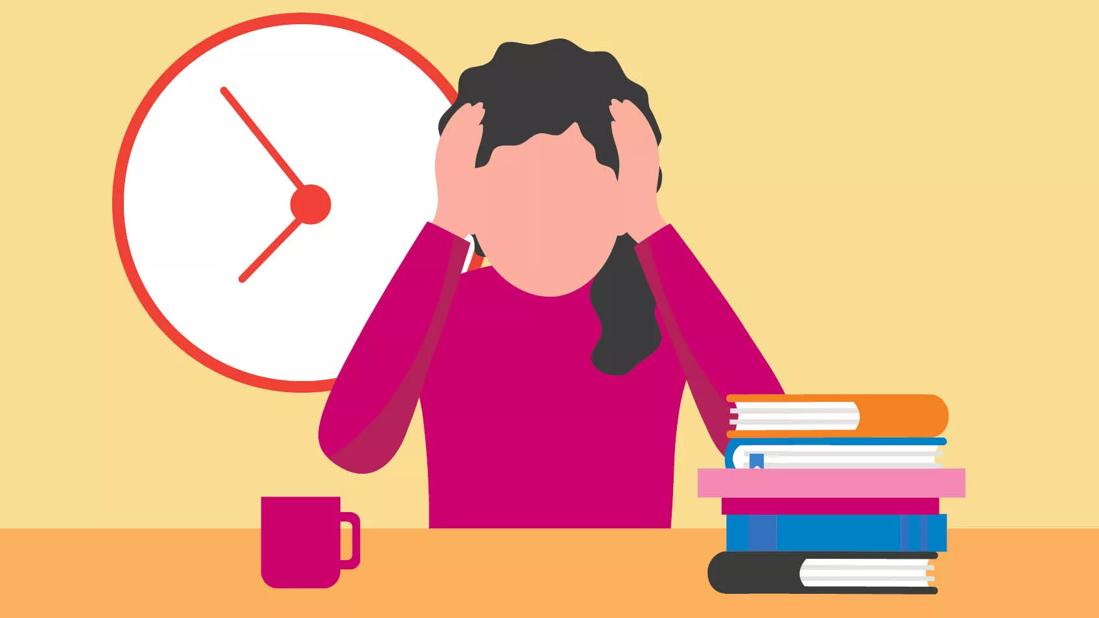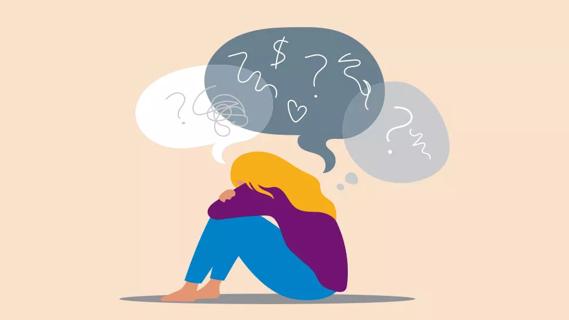Breathwork, sleep meditation and avoiding screens can help fight back morning anxiety

The morning light hasn’t hit your eyes for even five minutes and your mind is already racing. Immediately, a looming to-do list greets you: Chores, what to wear, work tasks ahead and more. Suddenly, you feel glued to the bed by your worn worries and can’t seem to get the day started.
Advertisement
Cleveland Clinic is a non-profit academic medical center. Advertising on our site helps support our mission. We do not endorse non-Cleveland Clinic products or services. Policy
This kind of morning anxiety is an all-too-common feeling for many of us. Whether it happens due to situational stress or because of an underlying anxiety disorder, morning anxiety can stop your day in its tracks before it even begins.
But there’s a way to tackle this, and you may have guessed it — it has a lot to do with your sleep patterns. Psychiatrist Joseph Austerman, DO, goes over what morning anxiety is, why it happens and how to manage it.
Morning anxiety is pretty much what it sounds like: It’s that feeling of dread that puts your body into fight-or-flight mode, even when there’s no danger around you. But this kind of anxiety pounces right when you wake up.
“Anxiety is a persistent worry,” says Dr. Austerman. “What makes morning anxiety really problematic is that it’s usually related to the night before. It may be related to something you went to bed thinking about, and then you wake up still affected by it.” He also notes that it’s common for these persistent anxieties to infect your dreams, too. This leads to feeling more wound up in the morning — and sometimes, you don’t even know why.
Overall, there’s nothing biologically different between morning anxiety and social anxiety or generalized anxiety. “Sometimes, it just hits people harder in the morning, and it’s associated with anxiety before bed as well,” clarifies Dr. Austerman.
Advertisement
Morning anxiety symptoms are similar to general anxiety you feel throughout the day, but as Dr. Austerman explains, you may feel more physical sensations rather than just a feeling of worry.
Morning anxiety includes symptoms like:
“What is happening biologically is that your body is going into a fight or flight response,” he says. “So, because of that, you start breathing really fast and your heart rate jumps up.”
In addition to the physical symptoms of morning anxiety, the specific worry we feel in the daybreak hours is usually about the day looming ahead of us. And these worries get magnified because you just woke up, the day hasn’t started and, as Dr. Austerman notes, you have nothing to distract yourself from this laundry list of worries.
“What ends up happening is that you get paralyzed,” he explains. “It can lead to someone not getting out of bed or calling into work sick more often.”
Our bodies work best when we keep them on a consistent sleep and wake schedule, so it’s no surprise that how we sleep can affect how we wake up — and vice versa. If you’ve been feeling a lot of morning anxiety, Dr. Austerman says it’s very likely you need to re-examine your sleep habits.
“What I often tell people is that we have to fix sleep first because we’re not going to be able to get at the underlying disorder if you’re not sleeping well,” he says.
Tackling morning anxiety can be a little tricky. How do you calm yourself down even before you wake up? It’s all about starting with an ounce of prevention the night before.
Here are some ways you can prevent and relieve morning anxiety:
To ensure that your mind isn’t waking you up with alarm bells the next morning, it’s important to have the best sleep routine possible.
Along with making sure you get about eight hours of sleep every night, it can be beneficial to try some specific relaxation techniques, like:
Play around with a few of these simple techniques to find out what works best for you, recommends Dr. Austerman. That way, you’ll be able to establish a consistent, relaxing routine to wind down at the end of your day — and alleviate, or lessen, morning anxiety.
“Being less anxious going to bed is going to help you be less anxious in the morning,” he reassures.
It’s important to avoid too much stimulation right before bed. Your brain is like a sponge, and if you give it too much information to hold onto, that will keep spiraling into the night and morning. This is why Dr. Austerman stresses the importance of avoiding screen time for at least a full hour before hitting the hay.
Advertisement
“Social media, and a lot of media in general, is geared toward keeping us emotionally keyed up and engaged,” he says. ”Scrolling the news on your phone or even watching an engaging TV show can keep your mind racing into the wee hours of the night.”
Another stimulant can come in the form of what you put in your body. “It’s good to stay away from caffeine at least a good three hours from bedtime, preferably a little bit longer,” he continues, adding that if you experience a lot of anxiety during the day, it may be a good idea to switch to lighter caffeinated drinks in the morning as well.
“If your anxiety is based in your stomach and you’re already having a rumbling stomach, caffeine is going to increase your motility and it’s going to make things biologically worse,” he points out.
You meditated before bed. You went to bed on time. But alas, you’re still anxious in the morning. What now? Thankfully, there are ways you can face any looming worries and get your day started easier. Dr. Austerman recommends using mental exercises that bring you back to the present, instead of letting your anxiety fast forward into the future.
This can include the same meditative techniques you might be using at night, but instead of focusing on putting you to sleep, you’ll want to find a guided meditation that helps you feel calm and inspired for the day ahead.
Advertisement
Dr. Austerman suggests saying some calming positive affirmations out loud, like:
All of this ties in with that reassurance that helps pull back the dread that your anxiety may be causing. “Once you’re able to arrest these worries about the future, then you say, ‘OK, all I need to do is get out of bed,’” he says.
If you’re feeling stuck in bed because of your anxiety in the morning, it may not be the best thing to shoot yourself out of bed as fast as possible. Instead, try approaching this feeling with a gentle nudge rather than a push.
Breathwork exercises can help with grounding yourself to the present moment. Some exercises to try include:
“What you’re doing with these techniques is slowing down your breath rate and allowing your heart rate to calm down,” Dr. Austerman explains. “Once you get the breathing going, then you can try focusing on your heart rate and even trying to slow it down.”
One of the toughest parts about morning anxiety is when it stops you from getting up. This is because morning anxiety throws a to-do list at us immediately, and we start to worry about all the things we need to do, but also that we need to do them right now.
Maybe your mind is immediately going to a meeting you have at work in the afternoon, or you start worrying about what you’re having for dinner. All these thoughts can begin to compound into a tornado in your mind, causing you to feel stuck.
To get unstuck, focus on each individual step of your morning routine. Don’t jump ahead to everything that needs to get done throughout the day.
Advertisement
“Once you’re out of bed, all you need to do is start your morning routine,” states Dr. Austerman. “Try to keep it as present-centered as possible, and just focus on taking that next step.
“That stuff you’re thinking about is always going to be there. Thinking about it is not going to make it any better. But if you just think about what you have to do, right now, and focus that energy on right now, you’re just taking one little thing off the plate every time.”
While morning anxiety can be something you tackle on your own through meditation and better sleep hygiene, there’s no shame in seeking help if you feel like it’s affecting your health. Persistent morning anxiety can be a sign of sleep problems like insomnia or some kind of unchecked stress in your life that you may need help with. No one deserves to start their day feeling anxious, so if it’s starting to weigh on you more than usual, be sure to talk to a healthcare provider or therapist to see what other options are available.

Sign up for our Health Essentials emails for expert guidance on nutrition, fitness, sleep, skin care and more.
Learn more about our editorial process.
Advertisement

Going home isn’t always easy, but there are ways to ease any stress you might feel

Managing stress can help you sleep more soundly

This fast-acting anxiety medication should never be taken with alcohol, despite what you may see on The White Lotus

Deep breathing, positive mantras and tackling negative thoughts can help get you out of your head and cool down your anxiety

Focusing on what you can see, feel, touch and hear can help you feel more present in the moment

Performance anxiety and stage fright are outsized stress responses that can creep up when you’re put on the spot

A healthy amount of anxiety can keep you safe from harm and motivate you to take action

Although different conditions, they can occur together or cause one another

Even small moments of time outdoors can help reduce stress, boost mood and restore a sense of calm

A correct prescription helps your eyes see clearly — but as natural changes occur, you may need stronger or different eyeglasses

Both are medical emergencies, but they are very distinct events with different causes